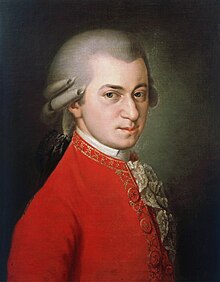Symphony No. 15 (Mozart)
Appearance

The Symphony No. 15 in G major, K. 124 by Wolfgang Amadeus Mozart was written in Salzburg during the first weeks of 1772. A note on the autograph manuscript indicates that it might have been written for a religious occasion, possibly in honour of the new Archbishop of Salzburg.[1] The work is in four movements, the first of which has been described as innovative and "daring",[2] in view of its variations of tempo.[3] The last movement is characterised by good humour and frivolity,[2] with "enough ending jokes to bring the house down".[3]
Movements and instrumentation
[edit]The work is scored for two oboes, two horns in G, and strings.[1]
Performance details
[edit]There are no details available as to when the initial performance took place.
References
[edit]Sources
[edit]- Dearling, Robert: The Music of Wolfgang Amadeus Mozart: The Symphonies Associated University Presses, London 1982 ISBN 0-8386-2335-2
- Kenyon, Nicholas: The Pegasus Pocket Guide to Mozart Pegasus Books, New York 2006 ISBN 1-933648-23-6
- Zaslaw, Neal:Mozart's Symphonies: Context, Performance Practice, Reception Oxford University Press, Oxford 1991 ISBN 0-19-816286-3
External links
[edit]- Sinfonie in G KV 124: Score and critical report (in German) in the Neue Mozart-Ausgabe
- Symphony No. 15 (W. A. Mozart): Scores at the International Music Score Library Project

